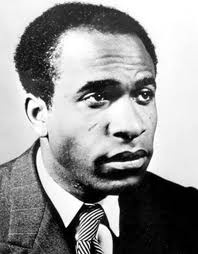This week, scholars and activists in North Carolina are considering the significant life and contributions of Black theoretician and activist Frantz Fanon. Born in 1924 on the Caribbean island of Martinique, then a French colony, Fanon studied medicine in France, practiced psychiatry in Algeria and became an important figure in the anti-colonial struggle in that country as well as in the movements for Black Power across the globe.The
Fanon symposium at UNC-Chapel Hill's Sonja Haynes Stone Center for Black Culture and History comes as the occupation of Wall Street enters the third week, with the announced arrival of a coalition of unions and community groups. As the world tries to figure out the meaning of the events in New York City and whether this is a long-awaited challenge to capital and elites from below, powerful and often-cited words from Fanon come to mind. Veterans of the social movements of the 1960s and 1970s, particularly the Black Freedom movement, when engaged in intergenerational dialogue often share this quote: "Each generation must, out of relative obscurity, discover its own mission, fulfill it, or betray it."These words from Fanon's "Wretched of the Earth" were the framework for national liberation activists -- students and workers in Africa, Latin America, Europe and the U.S. -- as they engaged Fanon's thinking on the psychological damage rendered by colonialism, violence and class.A film on Fanon's life will be shown tonight, with a Thursday evening keynote presentation by Mireille Fanon Mendés-France, Fanon's daughter and president of the Frantz Fanon Foundation in Paris. Friday features a full day of panels on topics including African revolution, transnationalism, and Fanon's influence on African-American radical traditions. The symposium will offer a comprehensive examination of a central figure in the struggle for African liberation during the 20th Century.At a time when Black communities are facing mass incarceration and devastating levels of unemployment in a so-called “post-racial” era, and activists are being
encouraged to look towards Occupy Wall Street, they might be interested in evaluating the experiences of the previous generation.For more information about the symposium, visit
here or
here.
Tags
@AjamuD
Ajamu Dillahunt is a Southern labor and social justice activist. He is a retired postal union leader and continues to work as a popular educator. His many organizational affiliations include the Black Workers for Justice, the Labor Network for Sustainability and the board of Fertile Ground Food Cooperative.
Email Ajamu
Knowledge matters.
From exposing abuses of power and holding powerful interests accountable to elevating the voices of everyday people working for change, Facing South has become a go-to source for investigative reporting and in-depth analysis of Southern issues and trends.
Support Facing South with a tax-deductible donation.
Donate

